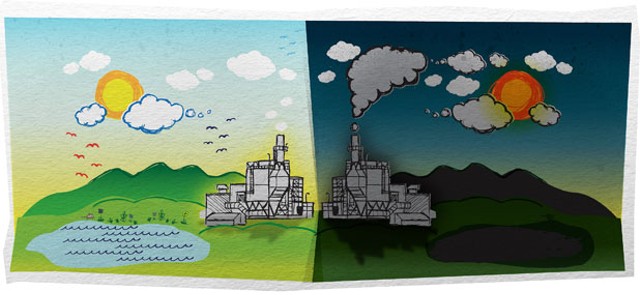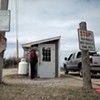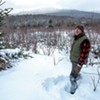Published January 16, 2013 at 12:31 p.m.
mmWhen Middlebury College fired up its $12 million biomass heating plant in 2009, the college held a public celebration with speeches and tours of the facility. Middlebury touted the wood-burning plant as a giant step toward its goal of achieving carbon neutrality by 2016 and positioned the boiler behind a wall of glass windows so everyone could see it.
Four years later, no one’s throwing a parade for Goddard College in Plainfield as it seeks to install a much smaller heat-generating biomass incinerator. Instead, Goddard’s getting hit with legal appeals and complaints from angry neighbors who say the biomass plant is so close to a number of homes that it poses potential health risks as a result of particulate emissions.
Eight residents near the college are challenging its permits in state environmental court and have circulated a petition to get a nonbinding question on Plainfield’s Town Meeting Day ballot, urging citizens to vote against the proposed “wood-chip incinerator.”
The negative reaction to Goddard’s project is unusual. In a state where a third of public school students attend classes in facilities heated by small wood-chip incinerators such as the one Goddard wants to build, opposition to biomass development has centered on industrial-scale plants that burn wood for electricity. Those include the McNeil Generating Station in Burlington, Ryegate Power Station and similar facilities proposed for Fair Haven and North Springfield.
Smaller, community-scale biomass facilities that generate heat have been insulated from criticism. So no one at Goddard, arguably the funkiest college in Vermont, was prepared for blowback from Plainfield, a town synonymous with alternative lifestyles.
“Honestly, we weren’t expecting it,” says Faith Brown, Goddard’s chief finance and administration officer.
“It was a complete surprise to me,” says Tim Maker, the president of Community Biomass Systems, which is managing the project for Goddard. “I had no idea that people would be upset by something like this. It comes from a place of fear.”
Is Vermont growing more skeptical of biomass power, whether for heat or electricity?
“There’s no question that the awareness of some of the impacts has increased — a hundredfold,” says Josh Schlossberg, Vermont’s leading anti-biomass activist. From his home in Waitsfield, Schlossberg edits a newsletter called the Biomass Monitor and coordinates with Energy Justice Network’s national antibiomass campaign. He says he was essentially “blacklisted” when he first arrived in Vermont and began criticizing biomass development.
“It’s a weird blind spot,” he says. “Everyone thought it was green, or didn’t know it existed.” Schlossberg believes that’s changing, albeit slowly. He remains frustrated that most mainstream environmental organizations aren’t raising alarm about large-scale biomass burning operations. Because biomass has been “cast as green for so long,” he says, environmental groups may be reluctant to wager their “green credentials” in speaking out against new developments.
Schlossberg isn’t alone in questioning the environmental and health implications of burning wood for heat and power. Rebecca Ryan, the American Lung Association of the Northeast’s director for health promotion and public policy in Vermont, points out that wood smoke contains thousands of chemicals, including at least five chemical groups known to cause cancer in humans. She says small particles in smoke can get trapped in the lungs or enter the bloodstream and are especially problematic for children, the elderly and those with chronic diseases.
For that reason, the ALA “strongly opposes” the combustion of biomass in schools and other institutions with vulnerable populations. More than 40 Vermont schools use wood chips to heat, but only five are large enough to require air quality permits under state regulations.
“This means that most of those schools do not have air-pollution-control technology, and kids could be at risk for greater exposure to particle pollution than before the system was installed,” Ryan writes in an email.
Also up for debate is the carbon neutrality Middlebury promised when its biomass plant went online four years ago. Bill Keeton is a professor of forest ecology at the University of Vermont and chairs UVM’s forestry program. He also runs a carbon dynamics laboratory in which he and other scientists are studying the role forests play in carbon sequestration — the important job of trapping and storing greenhouse gases instead of releasing them into the atmosphere.
Keeton says wood bioenergy is “often touted as being carbon neutral — clean, renewable, carbon neutral.” One assumption has been that even if carbon is released from a tree when it’s burned, that tree can be replanted and its carbon storage potential replaced.
But Keeton says there’s actually a lot of scientific uncertainty about that theory. “The devil’s in the details,” he says. Research now suggests that burning wood biomass might actually increase carbon emissions in the short term as compared to fossil fuels, even if biomass provides a net carbon benefit over the long term.
“The problem is that that near term is really important from a climate change standpoint,” says Keeton. “There’s this pretty well substantiated prediction that if we don’t do something about the climate, and about greenhouse-gas emissions within the next decade or maybe two decades at the most, we’ll see irreparable climate change … We’ve got to get a handle on this problem now. If there’s an unintended increase in emissions now, that could be a big problem.”
Keeton says there’s no broad consensus on biomass carbon accounting, but he notes there is compelling research coming out of UVM that suggests for all of biomass’s potential benefits, a reduction in greenhouse-gas emissions might not be one of them.
“This is one of those issues where things might seem to be intuitive, they might seem to be obvious … when in fact it’s really not,” says Keeton. The trick, he goes on, is to weigh the potential trade-offs.
In Plainfield, Goddard’s project has already earned Act 250 and local zoning permits, though neighbors are appealing both decisions in Vermont’s Environmental Court. A court-ordered mediation between the two groups failed last February. In the intervening months, the skirmish has escalated into a convoluted legal battle. The town of Plainfield brought its own attorney into the mix in November, though the town neither supports nor opposes the project, says selectman Bram Towbin.
In the latest parry, neighbors have gathered 70 signatures — more than the 50 required — to land a question on Plainfield’s Town Meeting Day ballot. It will ask residents to oppose the construction of the Goddard wood-chip incinerator until pollution from ultrafine particles, or nanoparticulates, are proven not to be a health hazard. It wouldn’t be a legally binding vote, acknowledges Karen Bouffard, who created the petition, but it would send a message to the college.
Goddard’s Brown contends that a few disgruntled neighbors “don’t a town make.” She says the biomass project fits perfectly with Plainfield’s town plan and is playing up its environmental benefits. The wood-burning boiler would replace 22 old oil-burning furnaces scattered across campus and be fueled by wood harvested within 35 miles of the school.
The plant would burn an estimated 900 tons of wood chips every year — a tiny fraction of the 400,000 tons burned at Burlington’s McNeil plant or the 20,000 tons burned at Middlebury.
The $2.3 million plant would also include a state-of-the-art scrubber, called an electrostatic precipitator, to minimize air pollution. Maker says the college’s trustees voluntarily added that feature despite its $130,000 price tag.
Rhea Wilson, one of eight neighbors opposing the project, admits that when she first heard about the project, she wasn’t overly concerned. She figured Goddard would plant trees to block the view — and the college has since added more landscaping. “My first reaction was, ‘This will be fine,’” recalls Wilson.
But the more Wilson and neighbors researched biomass, the more they found not to like — particularly the potential emissions. Wilson and Bouffard aren’t satisfied with the scrubber the college plans to install; they say nanoparticulates would still escape the chimney.
Community Biomass Systems’ Maker says their concerns illustrate the main problem in the biomass debate: Opponents are conflating industrial-scale electric plants, and the accompanying potential hazards, with Goddard-size ones.
He says, “People read about one kind of biomass and think it has relevance for everything.”
The print version of this article was headlined "For Some Near Goddard College, Wood Heat Isn't Good Heat".
More By This Author
Speaking of...
-

Stamford Wind Proposal Tests Whether Large Turbines Have a Future in Vermont
Nov 22, 2023 -

Vermonters Look for Cheaper Ways to Keep Their Homes Warm This Winter
Nov 9, 2022 -

GlobalFoundries Asks to Leave Green Mountain Power to Form Its Own Utility
Apr 28, 2021 -

Grid Block: Vermont’s Aging Transmission Network Can’t Keep Pace With Green Power Projects
Mar 17, 2021 -

Solar Flares: Call to Double Vermont's Renewable Energy Capacity Ignites Debate
Mar 10, 2020 - More »
Comments
Comments are closed.
From 2014-2020, Seven Days allowed readers to comment on all stories posted on our website. While we've appreciated the suggestions and insights, right now Seven Days is prioritizing our core mission — producing high-quality, responsible local journalism — over moderating online debates between readers.
To criticize, correct or praise our reporting, please send us a letter to the editor or send us a tip. We’ll check it out and report the results.
Online comments may return when we have better tech tools for managing them. Thanks for reading.
















































